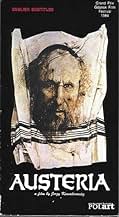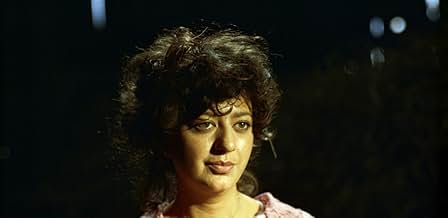During a pogrom in Poland on the eve of World War I, a group of Jews seek refuge from the Cossacks. The fugitives hide out in a rural inn, terrified that they may be given away at any moment... Read allDuring a pogrom in Poland on the eve of World War I, a group of Jews seek refuge from the Cossacks. The fugitives hide out in a rural inn, terrified that they may be given away at any moment.During a pogrom in Poland on the eve of World War I, a group of Jews seek refuge from the Cossacks. The fugitives hide out in a rural inn, terrified that they may be given away at any moment.
- Awards
- 1 win & 2 nominations total
Liliana Komorowska
- Jewdocha
- (as Liliana Glabczynska)
Featured reviews
How differently different people can observe and embody a film. An earlier review finds this film distasteful and full of anti-semitism, yet I had the opposite reaction. I felt I was observing an Issac Beshevis Singer short story of the old world on the other side of those destructive wars of the 20th Century. I found the lives of these Jewish people on the cusp of WWI sympathetic, real and alive. The fact that human passions, lust or longing fill their minds and hearts, at times, seems all too human. Yet, especially the inn keeper and the young man, they are also caring and sensitive souls who love and express this in various forms. The Hassidic are both profoundly spiritual and a bit absurd (to our secular eyes) dancing, singing and rejoicing even as the war comes closer to destroying the world they knew, which, as we know, was true. I found this vignette a touching, sensitive, wise portrayal of a moment in time that no longer exists, on the cusp of the end of an era. Rather than being anti-Jewish in any way, I found it an earthy and touching expression of that eastern European world that perished in time.
The first day of war in 1914, an austeria - which is an inn - near one of the Galician roads. Jewish runaways from the nearby town seek shelter in here. There are the bourgeoisie and the poor, radicals and religious Hasids. Somewhere near there are fights going on, fires starting, Cossacks preparing for battle, but in the inn passions and feelings blossom. There are arguments and the uncalm looks cross. There are also ritual dances of the Hasids, who are unaware of the danger. The old innkeeper Tag, a wise and experienced man, realizes the vague of the situation and decided to fulfill his moral duty to the end.
The movie, based on a novel (1966) by Julian Stryjkowski (1905-1996), is a nostalgic, poetic and cruel vision of the history and culture of the Polish Jews with their believings, traditions, legends and original humor.
"We wanted" said Jerzy Kawalerowicz "the film to be a movie of great metaphor, similar to a passionate, dynamic painting, which shows the world of Jews a moment before the tragical doom." "Austeria" was announced to be one of the best movies of the director - the movie won the Gold Lions at the festival in Gdańsk.
The movie, based on a novel (1966) by Julian Stryjkowski (1905-1996), is a nostalgic, poetic and cruel vision of the history and culture of the Polish Jews with their believings, traditions, legends and original humor.
"We wanted" said Jerzy Kawalerowicz "the film to be a movie of great metaphor, similar to a passionate, dynamic painting, which shows the world of Jews a moment before the tragical doom." "Austeria" was announced to be one of the best movies of the director - the movie won the Gold Lions at the festival in Gdańsk.
Did you know
- TriviaThe screenplay was written right after the 1966 publication of the novel by Julian Stryjkowski but eventually shelved because of the anti-Israeli atmosphere in Poland at that time. The film could have been made only after the Solidarity revolution of 1980.
- ConnectionsFeatured in Avant la bataille (1983)
- SoundtracksThe Blue Danube
Details
- Release date
- Country of origin
- Languages
- Also known as
- Austeria - Das Haus an der Grenze
- Filming locations
- Production company
- See more company credits at IMDbPro
Contribute to this page
Suggest an edit or add missing content






























